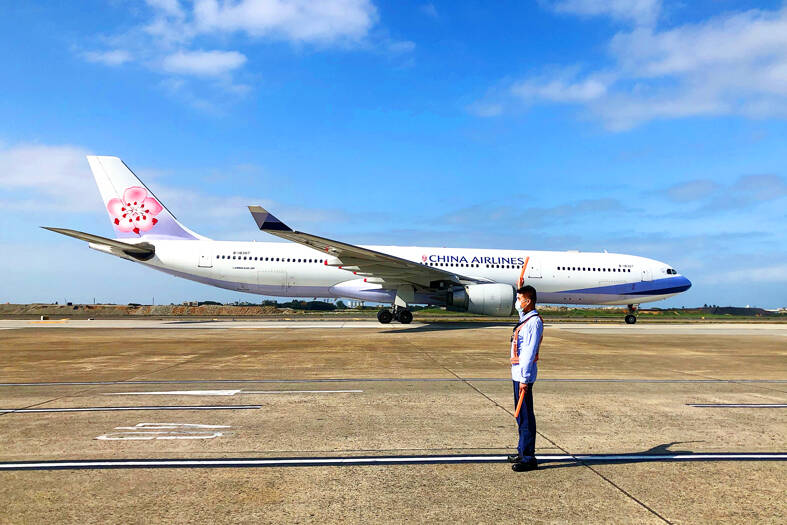Three Taiwanese airlines yesterday reported robust revenue growth for last month, as passenger demand picked up after border controls were relaxed.
China Airlines Ltd (中華航空) posted revenue of NT$12.67 billion (US$410.7 million) for last month, the highest for February in the past five years, as passenger revenue advanced 866 percent year-on-year to NT$7.08 billion, company data showed.
Bolstered by robust demand for flights to Japan and South Korea, revenue from flights to Northeast Asian destinations increased, contributing most to overall revenue, China Airlines said in a statement.

Photo: CNA
Revenue from flights to North America also increased, further contributing to the company’s sales momentum, it added.
“We provided 30 percent more flights in the first quarter than a year earlier, and also launched a campaign to boost sales during the long 228 Memorial Day holiday and Valentine’s Day,” the airline said.
However, its cargo revenue halved from a year earlier to NT$4.83 billion for last month, as demand fell amid slower economic growth, the airline said.
Starlux Airlines Co (星宇航空) yesterday posted revenue of NT$1.37 billion for last month, down 10 percent from January, but up 2,029 percent from a year earlier, company data showed.
The airline said that passenger revenue expanded 3,760 percent annually to NT$1.21 billion in light of rising demand for air travel, while its cargo revenue rose 326 percent to NT$122 million amid recovering demand after the Lunar New Year holiday, it said.
Starlux said it would launch a new route from Taipei to Sendai, Japan, next month and a new route from Taipei to Los Angeles, adding that it would increase its network points to 17.
Expecting demand for air travel to resume quickly, the airline said it is planning to launch more new routes in Asia, while it has begun to use wide-body aircraft for its Northeast Asian flights to provide at least 10 percent more seats.
Starlux said it would receive two new Airbus A350-900 jets this year, raising its fleet size to 21.
Meanwhile, EVA Airways Corp (長榮航空) posted an annual rise in revenue of 48 percent to NT$12.88 billion for last month, company data showed.

Taiwan’s foreign exchange reserves hit a record high at the end of last month, surpassing the US$600 billion mark for the first time, the central bank said yesterday. Last month, the country’s foreign exchange reserves rose US$5.51 billion from a month earlier to reach US$602.94 billion due to an increase in returns from the central bank’s portfolio management, the movement of other foreign currencies in the portfolio against the US dollar and the bank’s efforts to smooth the volatility of the New Taiwan dollar. Department of Foreign Exchange Director-General Eugene Tsai (蔡炯民)said a rate cut cycle launched by the US Federal Reserve

Handset camera lens maker Largan Precision Co (大立光) on Sunday reported a 6.71 percent year-on-year decline in revenue for the third quarter, despite revenue last month hitting the highest level in 11 months. Third-quarter revenue was NT$17.68 billion (US$581.2 million), compared with NT$18.95 billion a year earlier, the company said in a statement. The figure was in line with Yuanta Securities Investment Consulting Co’s (元大投顧) forecast of NT$17.9 billion, but missed the market consensus estimate of NT$18.97 billion. The third-quarter revenue was a 51.44 percent increase from NT$11.67 billion in the second quarter, as the quarter is usually the peak

The US government on Wednesday sanctioned more than two dozen companies in China, Turkey and the United Arab Emirates, including offshoots of a US chip firm, accusing the businesses of providing illicit support to Iran’s military or proxies. The US Department of Commerce included two subsidiaries of US-based chip distributor Arrow Electronics Inc (艾睿電子) on its so-called entity list published on the federal register for facilitating purchases by Iran’s proxies of US tech. Arrow spokesman John Hourigan said that the subsidiaries have been operating in full compliance with US export control regulations and his company is discussing with the US Bureau of

Pegatron Corp (和碩), a key assembler of Apple Inc’s iPhones, on Thursday reported a 12.3 percent year-on-year decline in revenue for last quarter to NT$257.86 billion (US$8.44 billion), but it expects revenue to improve in the second half on traditional holiday demand. The fourth quarter is usually the peak season for its communications products, a company official said on condition of anonymity. As Apple released its new iPhone 17 series early last month, sales in the communications segment rose sequentially last month, the official said. Shipments to Apple have been stable and in line with earlier expectations, they said. Pegatron shipped 2.4 million notebook